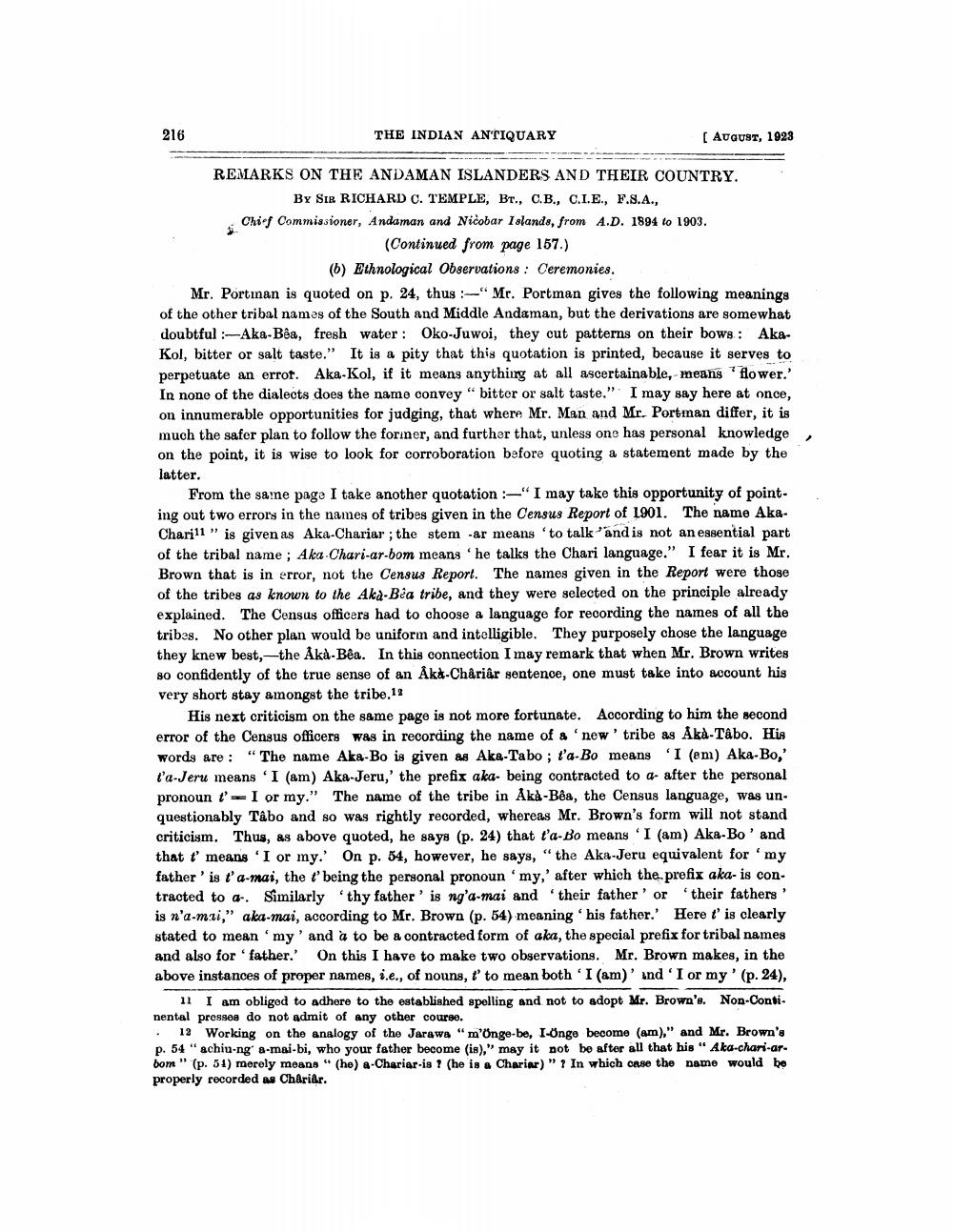________________
216
THE INDIAN ANTIQUARY
[ AUGUST, 1923
REMARKS ON THE ANDAMAN ISLANDERS AND THEIR COUNTRY. BY SIR RICHARD C. TEMPLE, Br., C.B., C.I.E., F.S.A.,
Chief Commissioner, Andaman and Nicobar Islands, from A.D. 1894 to 1903. (Continued from page 157.)
(b) Ethnological Observations: Ceremonies.
Mr. Portman is quoted on p. 24, thus:-" Mr. Portman gives the following meanings of the other tribal names of the South and Middle Andaman, but the derivations are somewhat doubtful:-Aka-Bêa, fresh water: Oko-Juwoi, they cut patterns on their bows: AkaKol, bitter or salt taste." It is a pity that this quotation is printed, because it serves to perpetuate an error. Aka-Kol, if it means anything at all ascertainable, means 'flower.' In none of the dialects does the name convey" bitter or salt taste." I may say here at once, on innumerable opportunities for judging, that where Mr. Man and Mr. Portman differ, it is much the safer plan to follow the former, and further that, unless one has personal knowledge on the point, it is wise to look for corroboration before quoting a statement made by the latter.
From the same page I take another quotation :-"I may take this opportunity of pointing out two errors in the names of tribes given in the Census Report of 1901. The name AkaCharill" is given as Aka-Chariar; the stem -ar means 'to talk and is not an essential part of the tribal name; Aka Chari-ar-bom means he talks the Chari language." I fear it is Mr. Brown that is in error, not the Census Report. The names given in the Report were those of the tribes as known to the Aka-Bea tribe, and they were selected on the principle already explained. The Census officers had to choose a language for recording the names of all the tribes. No other plan would be uniform and intelligible. They purposely chose the language they knew best,-the Akà-Bêa. In this connection I may remark that when Mr. Brown writes so confidently of the true sense of an Akà-Châriâr sentence, one must take into account his very short stay amongst the tribe.12
His next criticism on the same page is not more fortunate. According to him the second error of the Census officers was in recording the name of a 'new' tribe as Åkà-Tâbo. His words are: "The name Aka-Bo is given as Aka-Tabo; t'a-Bo means I (em) Aka-Bo,' t'a-Jeru means 'I (am) Aka-Jeru,' the prefix aka- being contracted to a- after the personal pronoun t I or my." The name of the tribe in Akà-Bêa, the Census language, was unquestionably Tâbo and so was rightly recorded, whereas Mr. Brown's form will not stand criticism. Thus, as above quoted, he says (p. 24) that t'a-Bo means I (am) Aka-Bo' and that t' means 'I or my.' On p. 54, however, he says, "the Aka-Jeru equivalent for my father' is t'a-mai, the 'being the personal pronoun 'my,' after which the prefix aka- is contracted to a. Similarly thy father' is ng'a-mai and their father' or 'their fathers' is n'a-mai," aka-mai, according to Mr. Brown (p. 54) meaning his father.' Here t' is clearly stated to mean 'my' and a to be a contracted form of aka, the special prefix for tribal names and also for 'father.' On this I have to make two observations. Mr. Brown makes, in the above instances of proper names, i.e., of nouns, t' to mean both 'I (am)' and 'I or my' (p. 24),
11 I am obliged to adhere to the established spelling and not to adopt Mr. Brown's. Non-Continental presses do not admit of any other course.
12 Working on the analogy of the Jarawa "m'önge-be, I-önge become (am)," and Mr. Brown's p. 54" achiu-ng a-mai-bi, who your father become (is)," may it not be after all that his "Aka-chari-arbom" (p. 51) merely means " (he) a-Chariar-is? (he is a Chariar)"? In which case the name would be properly recorded as Chariår.




